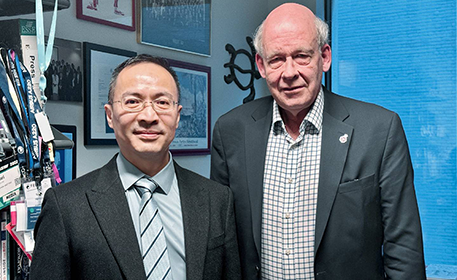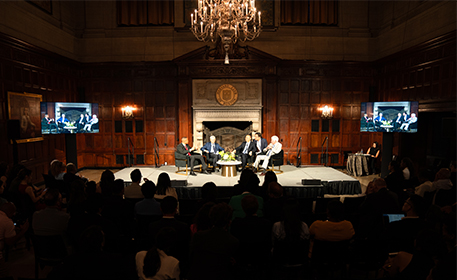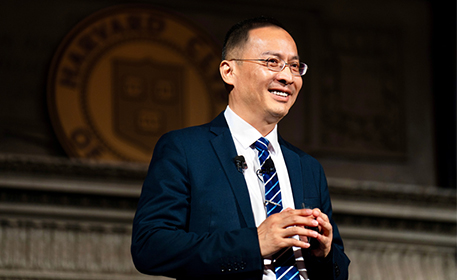Source: China Entrepreneur, No. 4, 2022
Written by Deng Shuanglin
Edited by Li Wei

Noah Xie looks more like a scholar. As the president of Kmind Strategy Consulting, he is often referred to by his clients and coworkers as “Mentor Xie” as if mentoring is his one true mission in life. If you know anything about the current competitive landscape in China’s consulting industry, you will know that it’s not easy for him to retain that kind of refined bearing.
Western firms have long dominated China’s consulting industry, with multinational giants like McKinsey, Bain, and Boston wielding power and influence as the market’s first movers. This is partly a result of Western management ideas prevailing since the start of China’s economic reforms. Local consulting firms have prospered in recent years but, as Weishan puts it, “are still not treated with much respect”. When he started Kmind, he had to keep explaining how it was different from Western consulting and the unique value it could bring to Chinese companies.
There is nothing harder than gaining trust. What finally gave Weishan and Kmind confidence were a number of their classic cases. With Bosideng, for example, Kmind has helped transform its brand image from aged and outdated to mainstream and fashionable in China’s down jacket industry, with group revenue exceeding 10 billion yuan in the fiscal year 2018-19 and reaching 13.5 billion yuan in the fiscal year 2020-21. It’s similar story for other clients, such as FIRMUS breaking the monopoly of foreign competition to become the first Chinese baby formula brand surpassing 10 billion yuan in revenue in 2018 and generating 18.6 billion yuan in 2020, or Yadea disengaging itself from price wars, breaking through 10-billion-yuan annual revenue in 2019 and going beyond 19.3 billion yuan in 2020. So far, five companies have joined the “10-billion club” thanks to Kmind.
打造了“五破百亿”的战略实践,谢伟山也成为了名副其实的百亿俱乐部“保荐人”。渐渐地,“去找谢伟山”,成为一些企业家圈子里的共识。
Helping 5 companies to achieve large-scale transformation has made Noah Xie a veritable “sponsor” of the 10-billion club. Gradually, he has become the go-to person among entrepreneurs.
师不必贤于弟子,弟子不必不如师。谢伟山已在咨询领域证明了这一点,但这位“谢老师”要做的事远不止于此。比起微观层面对企业的出谋划策,他认为自己对中国品牌及咨询业的未来同样背负着责任。
As argued by Han Yu in his essay On Teaching, “pupils are not necessarily inferior to their teachers, nor teachers better than their pupils”. This has been demonstrated by Weishan in consulting. But as a teacher himself, Weishan aims to do more than that. He believes he is as much responsible for the future of Chinese brands and the consulting industry as he is for advising companies.
面对百年未有之大变局,在新的转型周期下,中国品牌也需要寻求高质量发展的破局之路。“当前多数中国企业面临的最大问题,是仍然在套用西方的方法塑造品牌。但从我们的战略实践来看,回归中国情境、运用中国智慧融合西方理论来打造品牌,才是中国品牌谋求高质量发展的高效路径。”谢伟山说,他希望将君智打造成“中国的麦肯锡”。
Faced with drastic changes unseen in a century, Chinese brands are seeking a way to break out and achieve high-value development in the new transformation period. “The biggest problem for most Chinese companies today is that they are still using Western methods for brand building. But based on our strategic practice, for Chinese brands seeking high-value development, returning to the Chinese context and combining Chinese wisdom with Western theory is a much more effective way to shape their brands,” said Weishan, who wants to build Kmind into the “McKinsey of China”.
这个过程也许充满艰辛,但谢伟山似乎成竹在胸。他一直尝试用“游于艺”的方式对待自己的事业,在从容之境中涵泳性情,运筹帷幄,如鱼在水。
Arduous as the journey may be, Weishan seems to have a plan in mind. He has always tried to enjoy the process of pursuing his cause, exuding an air of relaxed calm as he maps out strategies like a fish in water.
《中国企业家》VS谢伟山
China Entrepreneur talks to Noah Xie
1.Returning to the fundamentals of business with a firm grasp of strategic priorities
China Entrepreneur: Amid the impact of COVID-19 and changes in the international situation, the world is fraught with ever more uncertainties, putting companies and entrepreneurs in an increasingly complex business environment. How do we cope with such uncertainty?
Noah Xie: We should put this in a broader context. The pandemic and international shifts aside, the global economy has effectively entered a phase of uncertainty since 2000. “Margins are razor-thin and it’s getting harder to make money” became a mantra in the corporate world. Globalization has eliminated national borders in the competition between companies, and business complexity is increasing.
According to The Art of War, “military tactics are like unto water”. Just as water shapes its course according to the nature of the ground over which it flows, one should modify their tactics based on the actual conditions. Facing uncertainty, entrepreneurs should focus more on their strategy. This will help them regain certainty, clear the fog to see the way ahead, and find solutions amid complexity. I always tell entrepreneurs not to be intimidated by the difficulties at hand. For now, the Chinese market is vast and deep with a clear hierarchy and still offers plenty of opportunities. With a clear strategy in mind, you will be able to register greater growth.
CE: In this new phase of high-value development, transformation is required for almost all the existing models. What do you think Chinese brands need to focus on most?
Noah Xie: Companies should prioritize stability in three key ways: first of all, maintain dominance in a certain field or market or among a certain group of consumers; second, stabilize prices, breaking out of price wars through strategy design; third, establish a base market that will keep them invincible.
很多红极一时的新经济品牌迅速没落,在于他们在基础的经营要素上缺乏积累和沉淀。流量红利消失后,企业就失去了竞争力。基础不牢,地动山摇,若要高质量发展,就要回归到商业的本质,在创造顾客认同的独特价值的同时实现某种社会价值。光靠某个风口催生出来的模式很难持续。
Many of the once-popular new-economy brands have seen rapid declines as they have failed to lay a sound foundation in key business factors. They lose their competitive edge as the traffic dividends disappear. Without a solid foundation, everything will eventually come tumbling down. To achieve high-value development, we should go back to the fundamentals of business and deliver social value while creating unique value for customers. Models born out of fleeting opportunities are not sustainable.
2. Defining brands in the minds of their customers
CE: The country has been encouraging the creation of self-owned brands in recent years. What problems or bottlenecks are Chinese brands facing at this stage?
Noah Xie: The biggest problem facing Chinese brands is that they are still using Western theory for brand building, a sign of collective confusion. In fact, business theory from the West is not necessarily applicable to the current situation in China.
For Chinese brands seeking high-value development, returning to the Chinese context and combining Chinese wisdom with Western theory is a much more effective way to shape their brands. As stated in Discourses of the States, “harmonious diversity fosters growth, and homogeneity is not sustainable”. There is a philosophy of harmony and aptness in the Chinese approach to complex matters that would not have been possible by relying on Western knowledge alone.
There is also a lack of brand awareness among many companies in China. They may think of themselves as brands, but having a registered trademark does not mean you have a brand. A brand should be defined and registered in the minds of its customers, with its unique value implanted in an imperceptible manner. A true brand is made when customers give preference to the products under your trademark when they are looking for a certain category of products.
CE: How has Kmind implemented Chinese wisdom in helping companies build their brands? Can you give an example?
Noah Xie: FIRMUS, for example, is a classic case of attacking an opponent where they are weak.
FIRMUS was one of many domestic brands that were doing well before becoming collateral damage in the 2008 milk powder scandal. The problem for FIRMUS at the time was not that customers shunned the brand, but that they were pushing away all Chinese baby formula brands. In response, we helped FIRMUS to take the lead with the slogan “more suitable for Chinese babies” based on the differences in dietary habits between China and other countries and the common perception among Chinese people that “eating local food nourishes the body”. We hit the imported brands on their weak spot, making it hard for them to fight back. Though foreign brands may enjoy advantages in brand equity, quality, and formulation, they can be quite a hard sell when it comes to catering to the nutritional needs of Chinese babies, which are of particular concern to Chinese mothers.
An opponent’s strengths are often accompanied by their weaknesses. And we need to look for that vulnerability that lies behind. This is what we call “dialectical thinking” in Chinese wisdom.
3. Combining the best of both worlds
CE: You have proposed the idea of “strategy directed at the human mind”, but the human mind can be difficult to read. How do you help entrepreneurs understand the minds of consumers?
Noah Xie: I’m not looking at specific people, but rather the abstraction of various types of consumers into groups of people, which is very important for strategy. It would be hard to get the job done without this abstract assumption. You have to be able to look at the big picture and see beyond the superficial.
Take this menswear brand we work with as an example. We need to find out who its consumers are. We divide them into those who recognize the brand and those who don’t know about it. And we look at opportunities based on the current market situation in order to attract new customers with the help of the existing ones. It may seem like a physical path, but to me, it’s a path to the human mind.
CE: So Chinese wisdom is better at understanding the “human mind”. How do we strike a balance between the Chinese and Western mindsets?
Noah Xie: The Western mindset is about mastering the “quantitative”, pursuing precision, science, and rationalization, whereas Chinese people excel in the art of “aptness”, which focuses on the ability to assess pertinence; not pushing something to its limit, but rather finding its most apt place. Looking at the world solely through a Western lens can easily lead to confrontation, division, and negation of all things. The Chinese approach to problems, on the other hand, is to resolve conflicts and turn opposition into agreement through an artful mastery of “aptness”. Just like in Bagua, a Chinese motif consisting of eight symbols that represent the fundamental principles of reality, the black and white, as well as yin and yang, are always interconvertible. And while we cannot entirely abandon Western theory as it’s particularly instructive in science, technology, and logic, we need to see its drawbacks. For example, it lacks an internal problem-solving capacity, which is where Chinese wisdom comes in. Chinese wisdom and Western theory both possess their unique storied histories and merits. Combining the best of both worlds will generate greater power and energy.






